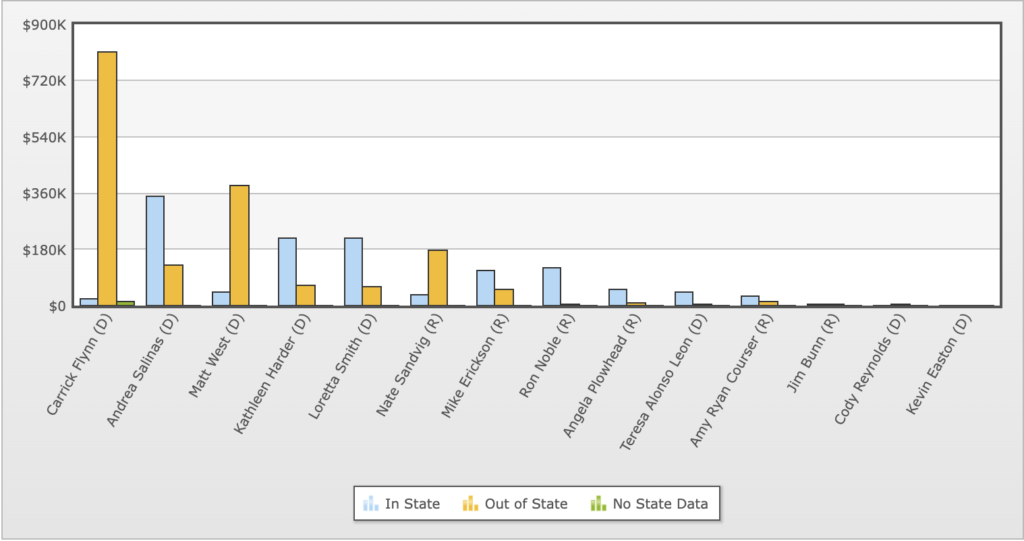Crypto billionaire Sam Bankman-Fried’s PAC of choice infused a record-breaking $11.3 million into political candidate Carrick Flynn, whose dramatic loss to Andrea Salinas in the Democratic primary for Oregon’s new 6th congressional district illustrates a hard-learned truth in American politics: wealth cannot guarantee political success. Just ask Michael Bloomberg, and then ask him again.
The incumbent-less race for Oregon’s 6th — created in September through census-based redistricting — saw all-time-high spending on a House primary contest. Andrew Mayersohn of Open Secrets told Slate the total was “several times the previous record for spending by a single group in a single House primary.”
The group in question is Protect our Future — a hybrid PAC funded almost solely by Bankman-Fried to the tune of $14 million. The 30-year-old is the founder of market maker Alameda Research and crypto exchange FTX. Like Flynn, he calls himself an “effective altruist.”
“I care about policy more than politics,” the crypto billionaire told Politico earlier this year. His first major foray into political funding began in 2020, infusing $5.2 million into two super PACs supporting now-President Joe Biden.
However, many remain concerned about crypto’s increasing involvement in policy-making. An executive at watchdog Revolving Door Project, Timi Iwayemi, said: “They want to work with lawmakers, but the goal is to create legislation that would absolve them of any current violations of securities law,” (via Politico, our emphasis).
- Bankman-Fried’s funding to Protect our Future was initially anonymous by routing the money through Prime Trust, a Nevada LLC.
- A spokesperson for Prime Tech revealed the true source of the funds, sparking controversy.
- The FTX founder said Protect our Future would update filings to show he contributed $13 million to the hybrid PAC; FTX engineering director Nishad Singh the remaining $1 million.
In the business of ever more expensive statewide and national campaigns, name recognition, earned media, and brand exposure generally have a positive correlation with success, as potentially millions of geographically disparate voters need to be wooed.
Only, history has shown that immense sums of money (personal or outside) can be as much of a political liability to a campaign as an asset.
Names like Clinton, Romney, O’Rourke, Brown, and Crist (and of course Bloomberg) have all found themselves unable to convert leading bank accounts into leading vote tallies, burning incredible sums of money to end up with Ls in their column. Now, it seems, is crypto-money’s turn to learn this expensive lesson.
Bankman-Fried and Flynn’s fat stacks weren’t local
House primary battles are waged over miniscule, geographically proximate constituencies. Just 41,196 Oregonians voted in the democratic primary — then-candidate Salinas’ primary campaign received a dominant 37% of the vote, representing a mere 15,485 voters.
Salinas’ campaign raised around half a million dollars and benefited from $1.6 million in outside spending. Flynn’s campaign spent $938,000 on attack ads alone.
However, Flynn only managed to get half the votes Salinas did. So what happened? Perhaps the key lies in a less widely reported funding disparity between the two campaigns.
In-state contributions to Salinas’ campaign exceeded those of Flynn’s by a staggering 1,700% ($349,000 and $20,200, respectively). Only 2.2% of all dollars donated directly to the Flynn primary effort were provided by residents of the state.

Read more: FTX chief ‘frustrated’ with crypto’s anti-regulatory messaging over Russia
While not determinative of success, it could help explain the substantial loss suffered by Flynn’s patron-funded campaign. People in Oregon were less enthusiastic about Flynn than people who wouldn’t ultimately be voting in the primary.
Local politics are ultimately local. While anyone, anywhere could contribute innumerable dollars, everyone may only vote once, and only where they live. The local people of Oregon’s 6th district have spoken with both their votes and their dollars, declaring a consistent preference for Salinas throughout this primary cycle.
Perhaps empirically inclined billionaires (yesterday’s Bloombergs, today’s Bankman-Frieds, and tomorrow’s mega-wealthy) will take a long look at the numbers… and rethink what they want to do with their vast fortunes. Then again, perhaps not.
For more informed news, follow us on Twitter and Google News or listen to our investigative podcast Innovated: Blockchain City.
The post Sam Bankman-Fried learns crypto donations don’t always win elections appeared first on Protos.
- "
- 000
- 2020
- About
- Ads
- All
- always
- American
- anyone
- anywhere
- around
- asset
- Bank
- began
- biden
- billionaires
- blockchain
- Bloomberg
- brand
- business
- Campaign
- Campaigns
- candidate
- care
- chief
- choice
- Column
- Congressional
- consistent
- contribute
- contributed
- controversy
- could
- create
- created
- crypto
- crypto exchange
- Current
- DID
- directly
- Director
- dollars
- donations
- dramatic
- Effective
- effort
- Elections
- emphasis
- Engineering
- everyone
- exchange
- executive
- First
- follow
- fortunes
- found
- founder
- FTX
- funded
- funding
- funds
- future
- generally
- goal
- Group
- help
- history
- House
- HTTPS
- Hybrid
- increasing
- informed
- IT
- Joe Biden
- Key
- Law
- lawmakers
- leading
- leading bank
- LEARN
- Legislation
- liability
- LLC
- local
- Long
- major
- maker
- managed
- Market
- Media
- messaging
- million
- million dollars
- millions
- money
- more
- National
- news
- open
- Oregon
- People
- perhaps
- personal
- policy
- political
- politics
- positive
- previous
- primary
- project
- protect
- question
- Race
- received
- record
- remain
- remaining
- representing
- Revealed
- Said
- Securities
- shown
- So
- Spending
- spokesperson
- State
- substantial
- success
- Supporting
- tech
- Through
- throughout
- times
- Trust
- Update
- us
- Vote
- voted
- votes
- Voting
- Wealth
- What
- while
- WHO
- win
- Work
- would
- year













